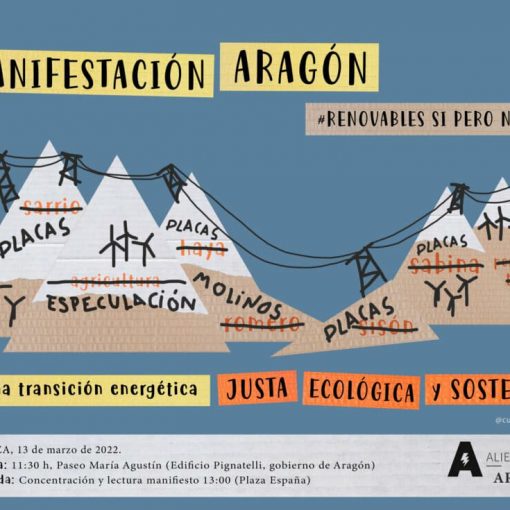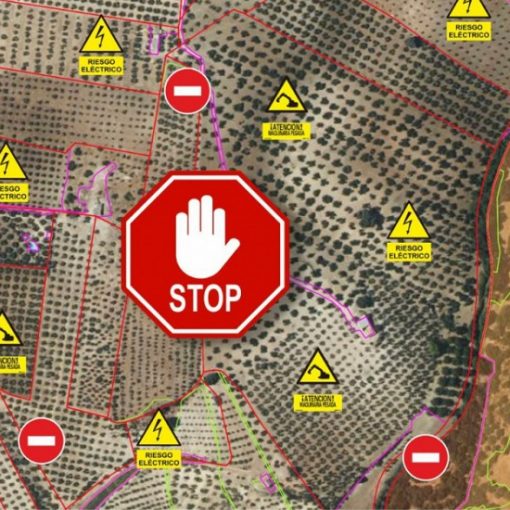NOTA DE PRENSA 22.02.2022
(más abajo en castellano)
ALIENZA ENERGÍA Y TERRITORIO (ALIENTE) CONTINUES WITH HIS ACTIONS AGAINST THE PROJECTS FOR THE ELECTRICAL INTERCONNECTION WITH FRANCE AND PORTUGAL
The week of the 7th of March, the European Parliament will vote the 5th list of the Projects of Common Interest (PCIs), a mechanism to strengthen power interconnection between the Member States with the aid gas pipelines and high voltage electric lines. In this context, ALIENTE [in English Energy and Territory Alliance] began a campaign urging the European Parlament to reject the list mentioned; on the grounds that it is a mechanism that will intensify the avalanche of megaprojects for the production of renewable energy presented in Spain because it allows for the energy produced to be exported to the rest of Europe. It urges, instead, the promotion of energy transition that is coherent with the Winter Package, and prioritizes the reduction of consumption, energy efficiency and energy self-consumption.
The presentation of a motion for a resolution to the list mentioned by the Group of the Greens/European Free Alliance (Greens/EFA) represented an opportunity for ALIENTE to contact the members of the Committee on Industry, Research and Energy (ITRE) and expose its own reasons to vote in favour of that motion. This voting, which took place at first instance last 2nd of February in the ITRE, resulted in a disappointing outcome since:
1.- The motion for a resolution was rejected with 57 against it and 18 in favour.
2.- It made clear that ITRE is taking into account neither the consequences that these electrical interconnection would have in the European energy market nor the socioeconomic and environmental impacts that the implementation of renewable energy production on a huge scale is having in Spain and in other European states.
Whereas the approval of the PCI list is a clear loss of an opportunity to develop an energy production model evenly distributed, sustainable and with social participation, ALIENTE will explain its position to each of the Members of the European Parliament with the aim of influencing the debate and the last voting, to be celebrated in the plenary session of the European Parliament of the week of the 7th of March.
Moreover, ALIENTE plans to contact other committees of the European Parliament to illustrate the clear impact that PCIs have against the objectives of other European directives about biodiversity, efficiency and energy saving, depopulation and the rural world.
LA ALIANZA ENERGÍA Y TERRITORIO (ALIENTE) CONTINÚA SUS ACCIONES EN CONTRA DE LOS PROYECTOS DE INTERCONEXIÓN ELÉCTRICA CON FRANCIA Y PORTUGAL
La semana del 7 de marzo, el Parlamento Europeo votará la 5ª lista de Proyectos de Interés Común (PIC), un mecanismo para fortalecer la interconexión energética de los Estados miembros mediante gasoductos y grandes líneas eléctricas. En este contexto, el pasado mes de enero ALIENTE iniciaba una campaña instando al Parlamento Europeo a rechazar dicho listado, entendiéndolo como un mecanismo para intensificar la avalancha de megaproyectos renovables en el Estado Español, al permitir exportar la energía producida al resto de Europa. En su lugar, insta a iniciar urgentemente una transición energética en coherencia con el Paquete de Invierno, que priorice la reducción del consumo, el uso eficiente de la energía y el autoconsumo energético.
Aprovechando que el Grupo de Los Verdes / Alianza Libre Europea (Greens/EFA) presentaba su propia objeción a dicha lista por la inclusión de proyectos de interconexión gasística, ALIENTE estableció contacto con los miembros de la comisión parlamentaria de Industria, Investigación y Energía (ITRE) para exponer sus propias razones para votar a favor de dicha objeción. Esta votación, que tuvo lugar en primera instancia el pasado 2 de febrero en el ITRE, arrojó un resultado decepcionante dónde:
1.- La objeción fue rechazada (57 votos en contra y 18 a favor).
2.- El ITRE mostró que no está teniendo en cuenta las consecuencias que estas interconexiones eléctricas tendrían en el mercado energético europeo y los impactos socioeconómicos y ambientales que está teniendo la implantación masiva de renovables en el Estado español y otros estados europeos.
Considerando que la aprobación de los PIC supondrá un claro coste de oportunidad para el desarrollo de un modelo energético distribuido, sostenible y participado socialmente, ALIENTE trasladará su posicionamiento a cada miembro del parlamento europeo, con el fin de incidir en el debate y votación última, que tendrá lugar en el pleno de la Eurocámara la semana del 7 de marzo.
Del mismo modo, entablará contacto con otras comisiones parlamentarias para evidenciar las afecciones que los PIC inducen en contra de objetivos buscados por otras directivas europeas sobre biodiversidad, eficiencia y ahorro energético, despoblación y mundo rural.



